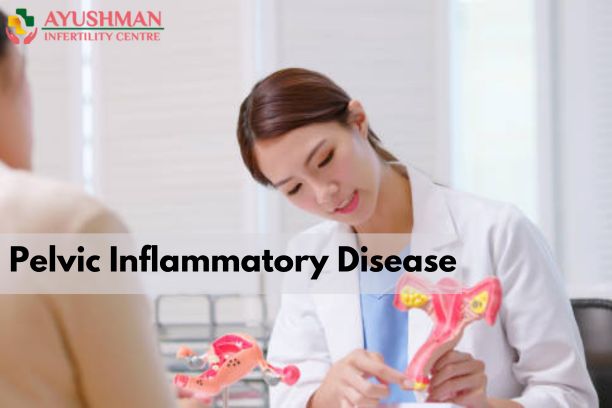
Pelvic Inflammatory Disease (PID)
Pelvic inflammatory disease (PID) is a condition marked by an infection within the female reproductive organs. It typically arises when bacteria transmitted through sexual activity migrate from the vagina to the uterus, fallopian tubes, or ovaries.
What is Pelvic Inflammatory Disease (PID)?
Pelvic inflammatory disease (PID) refers to an infection affecting the upper reproductive organs, such as the uterus, fallopian tubes, and ovaries. If left untreated, PID can lead to the formation of scar tissue and pockets of infected fluid (abscesses) within the reproductive tract, potentially causing permanent damage.
Symptoms of PID can vary from subtle to mild, with some women experiencing no noticeable signs. Consequently, PID may go unnoticed until fertility issues arise or chronic pelvic pain develops.
Symptoms of Pelvic Inflammatory Disease
The symptoms of pelvic inflammatory disease (PID) can be mild and challenging to identify, with some women experiencing no symptoms at all. When symptoms do occur, they commonly include:
- Pain in the lower abdomen and pelvis, varying from mild to severe
- Unusual or heavy vaginal discharge, often accompanied by an unpleasant odor
- Abnormal vaginal bleeding, particularly during or after intercourse, or between menstrual periods
- Pain during sexual intercourse
- Fever, occasionally accompanied by chills
- Painful, frequent, or difficult urination
When to Seek Medical Attention
It’s crucial to consult your healthcare provider or seek immediate medical attention if you experience any of the following:
- Severe abdominal pain
- Persistent nausea and vomiting, making it difficult to keep any food or liquids down
- Fever with a temperature exceeding 101°F (38.3°C)
- Foul-smelling vaginal discharge
Even if the signs and symptoms of PID are not severe, it’s important to see your provider as soon as possible. Vaginal discharge with an odor, painful urination, or abnormal bleeding between periods can also indicate a sexually transmitted infection (STI). If these symptoms occur, refrain from sexual activity and promptly schedule an appointment with your healthcare provider. Timely treatment of an STI can help prevent the development of PID.
Causes of Pelvic Inflammatory Disease
Pelvic inflammatory disease (PID) can be triggered by various types of bacteria, with gonorrhea and chlamydia infections being the most prevalent culprits. Usually, these bacteria are spread through sexual intercourse without protection.
In less frequent cases, bacteria may infiltrate the reproductive tract when the natural barrier provided by the cervix is disrupted. This can occur during menstruation, childbirth, miscarriage, or abortion. Additionally, there is a rare possibility of bacteria entering the reproductive tract during the insertion of an intrauterine device (IUD), which is a long-term form of birth control, or during any medical procedure involving the insertion of instruments into the uterus.
Risk Factors
Several factors can heighten the risk of developing pelvic inflammatory disease (PID), including:
- Being sexually active and under the age of 25.
- Having multiple sexual partners.
- Engaging in sexual relations with a partner who has multiple sexual partners.
- Unprotected sexual intercourse.
- Regular douching, which disrupts the balance between beneficial and harmful bacteria in the vagina and may obscure symptoms.
- A previous occurrence of pelvic inflammatory disease or a sexually transmitted infection.
Additionally, there is a slight increase in the risk of PID following the insertion of an intrauterine device (IUD), particularly within the first three weeks post-insertion.
Complications
If left untreated, pelvic inflammatory disease (PID) can lead to the formation of scar tissue and pockets of infected fluid (abscesses) within the reproductive tract, resulting in permanent damage to the reproductive organs.
Complications stemming from this damage may include:
Ectopic pregnancy: PID is a significant contributor to tubal (ectopic) pregnancies. Scar tissue formation in the fallopian tubes due to untreated PID can obstruct the passage of a fertilized egg to the uterus, leading to implantation within the fallopian tube. Ectopic pregnancies can trigger severe, life-threatening bleeding, necessitating immediate medical intervention.
Infertility: Damage to the reproductive organs caused by PID can result in infertility, characterized by the inability to conceive. The risk of infertility increases with each occurrence of PID, and delaying treatment significantly heightens this risk.
Chronic pelvic pain: PID can induce persistent pelvic pain lasting for months or even years. Scarring in the fallopian tubes and other pelvic organs may cause discomfort during sexual intercourse and ovulation.
Tubo-ovarian abscess: PID can prompt the formation of abscesses, and collections of pus, within the reproductive tract. While abscesses most commonly affect the fallopian tubes and ovaries, they can also develop in the uterus or other pelvic organs. If left untreated, an abscess can lead to a severe, life-threatening infection.
Prevention
To minimize the risk of pelvic inflammatory disease (PID), follow these preventive measures:
- Practice safe sex: Consistently use condoms during sexual activity, limit the number of sexual partners, and discuss your partner’s sexual history.
- Consult your healthcare provider about contraception: While many contraceptive methods do not safeguard against PID, employing barrier methods like condoms can help reduce your risk. Even if you are on birth control pills, using a condom with every new partner can protect against sexually transmitted infections (STIs).
- Undergo testing: If you are at risk of contracting an STI, schedule a testing appointment with your healthcare provider. Establish a regular screening routine if necessary. Timely treatment of STIs offers the best chance of preventing PID.
- Encourage partner testing: If you have PID or an STI, urge your partner to undergo testing and treatment. This approach helps prevent the spread of STIs and the potential recurrence of PID.
- Avoid douching: Douching disrupts the natural balance of bacteria in the vagina and should be avoided.

Leave a reply